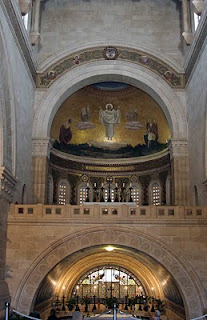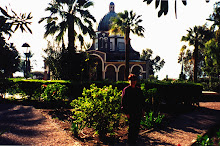
Solemnity of Christ the King/A
Matthew 25: 31-46
It all comes down to this. This is one of my favorite Gospel readings, and even though I’m not planning on dying anytime soon, this is the Gospel reading that I would choose for my funeral---because this is what it all comes down to.
There are two stories that have been all over the news in the last month. The first concerns the death of Steve Jobs, the inventor of tech devices that we think we can't live without. Much was made of his life, the true story of a brilliant but often mean guy, all that---but there was a little story at the end of October that got buried in the back pages. It was the story of the moment of his actual death. His sister gave the eulogy at his funeral and allowed it to be published. The interesting part has to do with what she reported as her brother's last words. As he slipped into death, he appeared to be looking past his family and said, with great wonder, "Oh wow. Oh wow. Oh wow." Whatever he saw took away the fear that most of us might have at that moment. I don't know what he experienced, but reading about that made me wonder what it is that would make me say the same thing when I am called home.
The other story is about the preacher who continues to incorrectly predict the "Rapture"—and either he is wrong, or it appears that we've all been left behind. I would also like to point out that the guy who predicted this is still here as well. Just sayin’ I think it's because the folks doing the predicting appear to be obsessed with the mechanics of how & when the Last Judgment will occur and are not paying attention to the business of actually preparing themselves for it.
So we arrive at the end of the Church year, and the Gospel gives us a vision of the Last Judgment. I wonder if this preacher has actually read this? The story of Jesus separating the sheep and goats only appears in Matthew's Gospel, but it's critical to our understanding of His message--the core of His moral code is here. Jesus lays out the standards by which all will be judged. He doesn't say anything about faith or belief---I think that it is assumed that the hearers are believers---so now that we believe, this is how we are to behave. Faith is what transforms us --- it moves us from belief to action. Jesus talks about how we are supposed to behave towards each other but never utters the word ‘rapture.'
The placement of this story in Matthew's Gospel happens just prior to the beginning of the Passion narratives and is essentially Jesus' last sermon, His final discourse----not His last words as he is dying, but one of His last teachings before his death. And it’s all about how we are to treat each other—we are to behave as though he or she is Jesus. That's a nice thought---until you actually have to do it. This is not easy, and most especially not easy for us in this country. Everything that Jesus challenges us with is so often in conflict with the culture that we live in. We live in one of the wealthiest countries in the world. What are we to think when we are always first, when we aren’t the last or the least? It’s like an unwritten rule that we are always supposed to be first, the biggest, the best. Not the least. The ‘least’ isn’t in our vocabulary or in our imagination, and so this teaching seems foreign to us. Perhaps He meant someone else? Certainly not us! When Jesus says that the last shall be first and the first will be last, and that whatever you do for the least you do for Me…….it changes the rules and it messes with our cultural myth. One of the most difficult things for us to understand is that we are, at our core, Catholic and Christian first---before we are anything else. For us, the Kingdom that Jesus proclaims is first. If we don’t understand this, the centrality of the Kingdom of God in the NT, then we will never begin to understand the ministry of Jesus. In the Kingdom of God, everything is upside down, everything is the opposite of what our culture calls us to.
We’ve all heard this story many, many times, so it can easily go over our heads if we aren’t careful. There are a number of things that are interesting about this story---and one of them is the only thing that the sheep and the goats have in common. They are both shocked when they find out that each person described as ‘least of these’ is really Jesus. Those in the sheep pile are shocked to find out that the ones they fed and sheltered were Jesus in disguise—“oh, that was YOU?” Those in the goat pile are shocked to find out that those they didn’t take of were Jesus in disguise—“Oh, that was YOU?” There is one major difference---the motivation to help. For the people in the sheep pile, it didn’t matter that it was Jesus---they were just doing what they knew was right. For the people in the goat pile, it’s more like “Oh, was that YOU? We would have done something if we had known it was YOU……..” Awkward. The young people that I work with would describe this in two words. Epic FAIL.
Matthew 25 isn't optional. It's a clear code of conduct for those who desire to live in the Kingdom of God. One of my Catholic school childhood memories was memorizing what were called the 'corporal works of mercy'--this is the text where those came from. We know them. Why is it so easy to ignore them? I think that one of the reasons is that we tend to dehumanize ‘the least.’ It’s easier to ignore ‘the least’ if we refer to them as parasites, scammers, lazy, illegals and all of the other pejorative and racist terms we come up with. If we have to think of them as human, as people in need, we can’t ignore them. Jesus says “Blessed are the poor.” “The last shall be first and the first shall be last.” He is “the least of these.” Why are the poor ‘blessed?” I think that it’s because they know something about God that we do not. In many ways, they are closer to God than anyone else, because they know, more than anyone else, how much they rely on God. They have nothing, and so nothing gets in the way. They have read Mt. 25 and they know that it’s about them. Those of us who don’t see Him in them are the ones who don’t get it. I love this quote from John Paul II “ Love for others, and in the first place, love for the poor, in whom the Church sees Christ himself, is made concrete in the promotion of justice. Justice will never be fully attained unless people see in the poor person, who is asking for help in order to survive, not just an annoyance or a burden, but an opportunity for showing kindness, and a chance for greater enrichment. Only such an awareness can give the courage needed to face the risk and the change involved in every authentic attempt to come to the aid of another.”
Approx. a year ago, I was watching TV, and the program host, who is Catholic, said this: "If this is going to be a Christian nation that doesn't help the poor, either we've got to pretend that Jesus was just as selfish as we are, or we've got to acknowledge that He commanded us to love the poor and serve the needy without condition--and then admit that we just don't want to do it." Which Jesus do we follow? The One who clearly states that those we call ‘parasite’ are “the least of these” and therefore Jesus Himself, or no? Each of us, in our own hearts, knows the answer to this question.
At the end of my day, I try to think over all the things that happened during the course of the last 12 hours or so. I try to think of what I did, what I didn't do, and the people I encountered. Did I recognize and serve Jesus in the ‘least of these’ or no? If I died tonight, which pile would I get sorted into—sheep or goats? And really----there's only one thing that I want at the end of my life--to wake up at the foot of the Throne of Grace with Jesus looking down at me. I know that He will know what I'm thinking, which will be this........"please, please, please let me go with the sheep." I pray that my life will meet with His approval---because the only thing that I want to hear from Jesus at that point will be two words. Just two words.
"You! Sheep!"
Oh wow.













